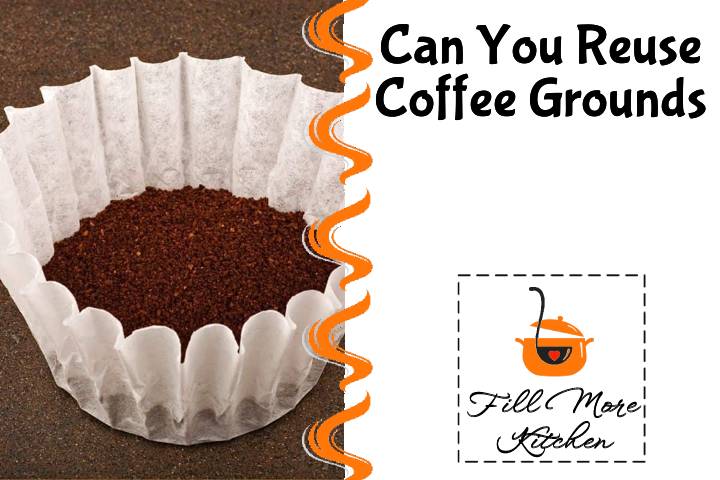As someone who drinks coffee regularly and prepares a pot every day, I tend to discard numerous used coffee grounds on a daily basis, which seems like an unnecessary waste. Therefore, I decided to investigate whether or not it is possible to reuse coffee grounds.
Surprisingly, coffee grounds can be utilized for various purposes other than making coffee due to their coarseness, residual caffeine content, and nutrients. Although they can be used to make a weak second cup of coffee, they are more effective as fertilizer, skin exfoliant, and bug repellant in households.
Here are some examples of how you can reuse coffee grounds in various ways, including outdoor, indoor, and personal applications.
How Long Do Used Coffee Grounds Last?
If you take the time to dry and store your used coffee grounds, they can remain usable for up to two years [1]. To ensure their longevity, it is important to keep them in a cool, dark place at room temperature and stored in airtight containers to prevent moisture from entering. You can use items such as airtight plastic containers, glass jars, or vacuum-sealed bags.
Improperly dried coffee grounds can lead to unpleasant odors, unsightly hues, and the proliferation of fungi, mold, and bacteria, which can pose health risks.
Is It Bad to Reuse Old Coffee Grounds?
If coffee grounds are prepared correctly, they can be reused for a second cup or dried out for various household uses. Unlike other food items, ground coffee does not expire and is not harmful unless stored improperly.
How Much Caffeine Is Left in Used Coffee Grounds?
Do you want to get more out of your coffee grounds? Reusing them can be surprisingly useful! According to the University of Navarra, spent coffee grounds contain 3.59 to 8.09 milligrams of caffeine per gram [2], so if you don’t feel like drying them out for later use, you can make a second cup with them – just know that it won’t have as much caffeine.
In comparison to unused coffee grounds, which contain 12 milligrams of caffeine per gram for the Arabica bean and 27 milligrams of caffeine per gram for the Robusta [3], the amount of caffeine in used beans is quite small. This implies that you won’t get a very good second brew from your already brewed grounds.
Uses for the Caffeine Content Left in Used Coffee Grounds
Nevertheless, you can take advantage of the remaining caffeine content as an insect repellent. The caffeine and other components found in the used coffee beans act as a natural pesticide, preventing insects from producing essential enzymes [4], leading to paralysis and death.
When coffee grounds are applied to the skin, the antioxidants of caffeine can help protect the dermal layers from sun damage (photoaging). It has been found to significantly reduce UVB-induced thymine dimer formation as well as sunburn lesions, acting as a natural sunscreen [5].
Unused caffeine content can be beneficial for other purposes such as improving blood circulation to the skin, which may help in reducing the visibility of cellulite, dark circles, and puffiness around the eyes.
Can You Reuse Coffee Grounds in a French Press?
If you are a fan of the French Press for making coffee, you might be curious about the possibility of reusing your coffee grounds for another cup. The response is affirmative, but it is necessary to reuse them within 15 minutes and preferably right away because the longer you wait, the more bitter your subsequent brew will become.
If you decide to reuse coffee grounds, keep in mind that the second cup may not be as flavorful as the first one because most of the flavor is extracted during the initial brewing process, even if you use a strong-tasting coffee.
What Other Uses Do Used Coffee Grounds Have?

Coffee grounds can be utilized for various purposes other than just making coffee.
- DIY Plant Fertilizer. Coffee grounds contain a plethora of essential minerals like nitrogen, calcium, iron, potassium, magnesium, phosphorus, and chromium that are crucial for the healthy growth of plants. Due to this distinctive chemical composition, coffee grounds make an exceptional fertilizer that also draws worms to enhance outdoor gardens. Sprinkling the grounds around your plants and watering them as usual is all that’s required.
- For Composting. If you have the time or don’t require fertilizer right away, transforming your coffee grounds into compost is a viable option. Compost is beneficial for all gardens since it aids in water retention and nutrient enrichment of the soil. Combining 40% coffee grounds with 60% kitchen and yard waste produces high-quality compost with minimal greenhouse gas emissions.
- Eliminate Odors. Used coffee grounds are effective in absorbing potent smells, and you can utilize them to neutralize unpleasant odors in your trash by putting them in a mesh bag (such as pantyhose) and suspending it inside the lid of the garbage bin.
Another way to utilize coffee grounds is by using them to deodorize your refrigerator. Instead of relying on baking soda, which some people use, you can opt for coffee grounds that have a higher absorption rate and can leave your fridge smelling delightful. Simply take a piece of cheesecloth, fill it with dry grounds, and position it on one of the shelves in your fridge.
If you frequently use garlic or onion in your cooking, you may be familiar with the strong odor that lingers on your hands. However, a simple solution to this problem is to moisten your hands and rub a small quantity of coffee grounds on them, followed by rinsing with cool water.
- Reuse Coffee Grounds for Natural Cleaning Scrub. Old coffee beans, whether wet or dry, can be utilized to clean pots and pans that have stubborn food particles. Simply sprinkle the grounds on the surface and scrub with warm water. This technique is also effective for heavily soiled kitchen countertops.
- Get rid of dead skin cells by exfoliating your skin without spending money on store-bought exfoliants. Instead, use your used coffee grounds mixed with warm water and a natural oil like coconut as a face and body scrub. Rinse off with cool water after applying.
- Natural Dyeing with Coffee Grounds. Reusing coffee grounds as a natural dye is an effective way to create a vintage look on paper, fabrics, cellophane, easter eggs, and dark-colored hair since they still bleed their color easily even after use. To achieve the desired color, mix the grounds with water and apply them to the material before wiping or rinsing them off.
- Conceal Scratches on Furniture. If you own dark wood furniture or items with espresso finishes, you can utilize coffee grounds to hide any scratches. Mix a small quantity of old and dry grounds with a bit of warm water to create a paste. Apply the paste over the scratch and leave it for several minutes before wiping it away gently with a cloth. The wood will be stained by the coffee, which will make the scratch less visible.
- Tenderize Meat Cuts. The natural acids and enzymes present in coffee can effectively break down the fibers of meat, making it a great tenderizer when used coffee grounds are added to your preferred dry rub and applied two hours before cooking. Alternatively, you can create a marinade by re-brewing the coffee grounds, letting them cool, and marinating the meat for 24 hours.
- Drain Cleaner. If you have clogged up drains, you can utilize the abrasive texture and potent aroma of the used grounds to unclog them. All you need to do is boil the coffee grounds in hot water, and pour the entire mixture down the drain. This method not only clears out blockages but also freshens up the drain. It works well for all types of sinks including kitchen sink, bathroom sink, and bathtub.
- Grow Mushrooms in a Bucket. It is challenging to cultivate mushrooms because they have unique requirements and do not behave like typical plants, but using used coffee grinds as a substrate can provide the ideal conditions for their growth. These grinds contain all the necessary nutrients that mushrooms need, and they are pre-sterilized from being boiled. You can obtain guidance and materials from a nearby gardening store to discover how to grow your own mushrooms.
-  Using Coffee Grounds in Recipes for Flavor. Used coffee grounds can be used to add a unique texture and taste to many baked goods. Some great recipes that use coffee grounds include leftover espresso ground brownies, peanut butter espresso smoothie, chocolate-coffee scones, Rosemary coffee-orange granola, Irish beef stew with Guinness and coffee, and even espresso overnight oats.
To conclude, coffee grounds can certainly be reused, either for a second cup of coffee or for various purposes such as beauty products, environmental applications, and household cleaning.
Ensure that when utilizing coffee grounds for household purposes, you adequately store and dry them beforehand, either by drying in the oven or under the sun and then storing in an airtight container.
You can also check this video about “Can You Reuse Coffee Grounds? (It’s Surprising How Useful They Are)”
Check out our top 10 reviews!
Related posts
https://fillmorekitchen.com/can-you-leave-cake-out-overnight/
https://fillmorekitchen.com/why-is-there-white-stuff-in-my-cup-of-coffee-can-i-drink-it/
https://fillmorekitchen.com/10-substitutes-for-syrup/
https://fillmorekitchen.com/can-you-reuse-coffee-grounds-its-surprising-how-useful-they-are/
https://fillmorekitchen.com/how-to-fix-dishwasher-error-code-e3/



